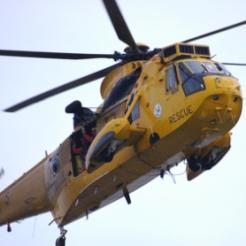Backbench MPs supported a motion calling on the government to review the issue of air ambulance services paying VAT on fuel during a debate in the House of Commons yesterday.
The debate was triggered by an e-petition, started by a member of the public, calling for a refund of VAT payments, which attracted more than 100,000 signatures – the number needed to be eligible for debate in the Commons. As MPs debated the issue last night the petition reached 150,000 signatures.
The motion was introduced by the Conservative MP for Hexham, Guy Opperman who asked the House of Commons to call on government to conduct an urgent published review of the situation in the next 12 months. He also asked that government considers providing grants to the air ambulance service to cover the cost of VAT on the fuel they purchase, again within the next 12 months.
Opperman compared the air ambulances to the lifeboat service, which is exempt from the EU directive and does not pay VAT on marine diesel. But when that exemption was put in place in 1977 the air ambulance service did not exist.
Opperman said: “Today I will ask the House to accept one basic principle: that there is no real difference between a lifeboat and a helicopter."
He added: “They are both, I suggest, providers of life-saving emergency services that deserve all our support and all the exemptions made available for their vital work so that they may continue.”
He claimed that the cost to the Treasury would be, “considerably less than £200,000 a year”.
Hugh Bayley, the Labour MP for York Central, whose constituent, Ken Sharpe, started the campaign, told MPs that the Labour MEP for Yorkshire and the Humber, Linda McAvan, recently asked the EU Parliament about the issue and was told: “Member States are free to address the problem of unrecoverable VAT by the introduction of so-called compensation schemes.”
Bayley argued that the government should agree to the request because “the proposal has captured the public imagination”. The petition reached the milestone of 100,000 signatures in a record 39 days.
He added that his “advice to members of the public who support the cause is: do not let up the pressure and keep reminding the government that the issue will not go away”.
Government response
Financial Secretary to the Treasury, Mark Hoban, said the government appreciated the work of air ambulance charities.
But he said that comparing helicopters to lifeboats was inaccurate as the RNLI exemption relates to international transport, not its life-saving services, and that a change in EU law would be necessary to create an exemption.
On the subject of a review, he said that there were already two reviews underway - one into the capability and funding of emergency services in London following the coroner’s report into the 7 July bombings, and another into the tax position of healthcare charities.
Hoban said: “I therefore suggest that, rather than having a separate, Treasury-led review, the most efficient way forward is for the existing engagement to continue, and for the Department of Health and the Treasury to work collaboratively to consider the tax impacts of different funding models as part of the wider work already in hand.”
He said the two departments were working closely together but “if it is ultimately not covered, the Treasury will carry out its own review” and agreed that it was “possible in principle to introduce a refund system”.









